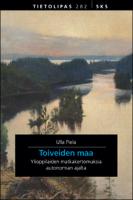Toiveiden maa
Ylioppilaiden matkakertomuksia autonomian ajalta
Abstract
Finland was an autonomous Grand Duchy in the Russian Empire during the years 1808–1917. At this time nationalism as well as other ideologies reached Finland from Europe, which strengthened the willingness to change both in society and on a governmental level. The Fennoman movement, which was a movement focusing both on language and on nationalism, became the core of the Finnish self-perception. The goal was to define Finland as a coherent and separate country in relation to its neighbouring countries. Collecting folk poems and learning to know one’s home country became essential. People saw the Kalevala poems as a way to understand and define the Finnish identity and the history of the Finnish people. Especially young people with a background in academia were intrigued by these ideas. University students collected poems all over the Grand Duchy of Finland as well as in the Russian part of Carelia, in Sweden, Norway and in Ingria. Students who collected these folk poems also wrote travelogues about their travels and all this material was handed over to The Finnish Literature Society. These documents are unique and there has not been much research done on them, especially with the focus on how the young academic generation during the age of autonomy defined their home country, their national self-perception, themselves and the commoners living in the rural parts of the country. This book reviews travelogues written by one hundred university students who travelled in the country collecting folk poems during 1836–1917. The book offers insight into how the students described Finland and what it meant to be Finnish. Travelogues can be defined as a sort of hybrid of texts. They consist of a mixture of letters, journals, biographical texts and travel books. Consequently, the image that the students depict of Finland is in this study based upon research perspectives and methods used in textual research, oral history and travel literature. The travelogues written by students previously evoked the interest of researchers who mainly studied certain traits of poem collectors, tradition bearers or poems. However, the travelogues contain plenty of information about the lives of the people who lived in the areas where the poems were collected. The descriptions of Finland in the travelogues do not represent the “real” 19th century Finland, but instead it is a story written and created by university students. The characteristics that are presented in The Land of Hope are based on how the intelligentsia perceived “real” Finnishness as opposed to the uneducated commoners living in the rural parts of the country. The most notable themes in the travelogues are the state and the future of the society and of being Finnish. Another theme is the otherization of those who were uneducated commoners. These themes describe the fears and hopes that university students had about Finland. They also show us that the travelogues were ideological texts about Finland and Finnishness that united the collectors of folk poetry. This book studies the collection of folk poetry in the context of the ideologies during the age of autonomy and it explains what the collection of poems meant and who were involved in it. Furthermore, the book gives an insight into the possibilities to pursue academic studies and it also presents the most essential sources of students’ knowledge about Finland at that point of time.
Keywords
era of autonomy; history and research of folk poetry; textual research; travelogues; folklore collection (activity); FinlandDOI
10.21435/tl.282ISBN
9789518586220, 9789518586244, 9789518586237, 9789518586220Publisher
Finnish Literature Society / SKSPublication date and place
Helsinki, 2023Imprint
Finnish Literature SocietySeries
Tietolipas, 16Classification
Folklore studies / Study of myth (mythology)
History


 Download
Download Web Shop
Web Shop